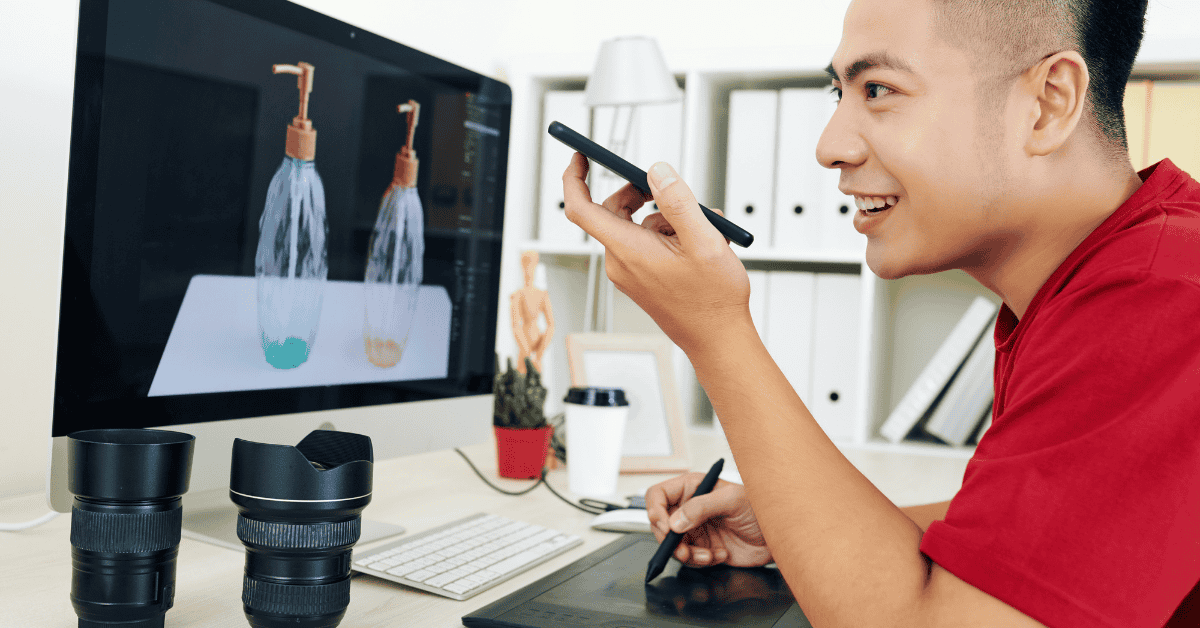If you’re anything like me, you think that your voice sounds positively Adele-like the moment you step into a shower cubicle.
Then, for whatever reason, that same voice does a 180-round-turn when on a call- becoming alien nearly beyond recognition.
You’re here because you’re wondering the same thing that I’ve pondered:
“Why does my voice sound different on the phone?”
Your speaking voice is usually different from the voice you hear in your head, and as a result, your voice will sound different if you hear it back on any recordings.
This may be why you find yourself cringing if you hear your voice on a recorded phone call!
However, the way that your voice sounds can also be affected by the quality of the microphone on your cell phone and your headset.
So if you’re adamant that you’re not just in denial, it may also be a good idea to look into updating your audio accessories if you think that they are affecting the way your voice sounds on a call!
Why Do We HATE The Sound Of Our Own Voices?
The reason we hate our own voice is psychological.
This is a phenomenon called “Voice confrontation.”, and it scientifically describes a situation where you are disappointed with the way your voice sounds when you hear it.
In the majority of cases, we don’t expect our voices to sound as dissimilar from the way they actually sound.
The difference, in reality, can then make us cringe when we hear our voice played back to us.
The contrast in how we sound can be caused by a combination of audio quality, audio frequency, and extra-linguistic cues.
When we speak, the sound we hear travels differently when compared to hearing another person speak.
The sound of another person speaking reaches our ears after traveling through the air.
However, it’s different with our own voices. The sound waves from our voices will travel internally (via bone conduction) through our bodies to our ears.
In an article for Time Magazine, Laryngologist Martin Birchall stated that hearing your own voice when you talk is like “hearing it through a cave complex inside our own heads.”
Birchall further explained that the sound vibrations travel through different parts of the cranial cavity and the sinuses.
Because of the different ways that the sound waves travel, there will be differences in how our voices hit our ears.
As a result, our voice might not sound externally the way we hear it internally in our head!
Why Does My Voice Sound Weird On The Phone?

Sometimes your voice can sound so different when you call someone that you may even find yourself questioning if it is, in fact, you speaking!
The voice that plays back to you sounds like that of a different person entirely.
When you hear yourself talk, there are several processes going on internally.
First, when you are speaking, your voice will create sound energy waves that will vibrate against your eardrum.
This vibration will alter the sound you hear so that it becomes different from the sound that other people will hear when you talk.
Your vocal cords will also be creating vibrations in your skull when you are speaking.
These vibrations will make your eardrums vibrate as well as they reach the inner ear. Again, this will have a further effect upon how you hear your voice.
This vibration of your ear drum can be deceptive. It can make your voice sound deceptively deeper than what it is in reality.
This deception might make you wonder why your voice sounds so high when you hear it over the phone or on a recording.
Another reason your voice sounds different over the phone (not related to yourself) could be the quality of the microphone on your phone or headset.
In most cases, cell phones will have microphones that are approximately 300 Hz to 3400 Hz. The microphone may not pick up all the vocal frequencies with this range.
There is also plenty of data that’s being beamed over the network at the same time.
To make space for all this information being broadcast, most phones will use a compression algorithm to transmit small bits of data. This compression can also lead to a slight change in your voice.
How Can I Hear My Real Voice?

Now we know the reasons why we don’t like the sound of our voices, and why our voices sound different over the phone, we can look at some of the tips that will help you to hear (and even accept!) the sound of your natural voice.
Stop Expecting The Voice In Your Head
The first thing you need to do when you want to hear how your voice actually sounds is to calm your mind.
Our minds process an absolute onslaught of information in a single day. Processing all this information can be difficult, and can result in our brains saving time by filling in data it already possesses.
When our minds feel overwhelmed, they will start to rely on what’s familiar, which can of course, be misleading!
Therefore, the first step to hearing your real voice is to stop listening for the voice you expect and to listen for what you REALLY sound like.
Listen To Recordings Of Your Voice

If you want to change how your voice actually sounds, recording your voice is an essential next step in your training.
A recording will let you know exactly how you sound and where you need to adjust and improve.
You can record your voice on a voice recorder, a smartphone, or even your laptop! Once you’ve made a recording, you’ll want to listen to it over and over again to identify what aspects of your voice you want to change.
Listening to a recording of yourself speaking can be difficult at first.
Remember, your goal is to learn what you want to improve with your voice. Listen for what you can’t stand about your voice, and plan out what you are going to change!
Practice, And Practice More
After you’ve listened to the recording of your voice and spotted what you want to improve, the next step is practice.
As the old saying goes, “Practice makes perfect”!
It can be nerve-wracking and even frustrating when you have to keep practicing the way you want your voice to sound. But the more you practice, the more you’ll get used to it and feel assured.
Just keep in mind that you need to stay calm, practice consistently- and don’t put too much pressure on yourself.
Keep practicing until the exercise starts to become fun and you find yourself enjoying the process!
Control Your Breathing

Usually, when people try to adjust how their voice sounds, they tend to concentrate too much on their breathing.
Focusing too much on your breathing can lead to fluctuating, unnatural sounds when you’re speaking.
When you’re training to change your voice, you need to remember that your breath plays a significant role in how you sound.
So when you practice, try to breathe as normally as possible! Eventually, you’ll learn to relax while working on your voice and speaking in your adjusted tone.
In Summary
When listening to how your voice sounds when you speak on the phone or even on a recording, you may find that you don’t not hear what you expected.
However, know that you’re not alone!
This is a common phenomenon, and many people find they don’t like the way they sound when they listen to themselves.
There are a few different physical explanations for the different ways your voice sounds on the phone, such as the quality of your phone microphone and the way the sound travels when it hits your ear.
No matter the reason, it is important not to become too self-conscious or worry too much about how your voice sounds.
After all, what’s most important is what you are saying, and not how you sound when you say it!
Just like us, smartphones consist of a pretty complex anatomy. Take a close look HERE at all the vital components that make up a modern-day smartphone!
